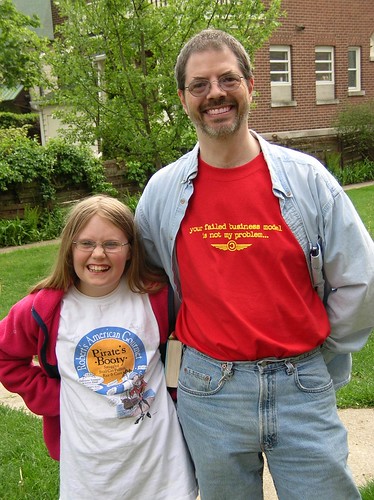Bear with me on this.
This morning I was thinking about the Bible courses I taught this fall, in which I put a particularly heavy emphasis on students’ getting a handle on what we used to call “the text itself.” That is, instead of inculcating someone’s particular (correct) perspective on Romans or John, we read through the documents and paid attention to what we noticed about them. Now, it goes wihtout saying that I exercised guiding force in that reading, so they were exposed to my own perspective on these books — but that influence (a) was more gentle than coercive (plenty of students did not end up parroting the points I think most illuminating in these cases) and (b) was not encoded in a syllabus that cites published sources (which tends to convey the sense that these interpretive readings constitute a para-canonical authority). It’s a lot easier to argue with me than with an article in the Journal of Biblical Literature.
In directing the classes toward close reading of the subject texts, I gave a relatively light apparatus of secondary sources in the syllabus. That feels awkward for a card-carrying Biblical Expert, but I didn’t want to send students the message that “Goodacre is the definitive authority on this passage,” or “Davila and Bird have staked out the two rival positions on this.” For one thing, such assignments tend to collaborate with a cultural proclivity to choose up sides and cheer for your heroes and hiss the villains. Further, there aren’t so very many well-written essays on biblical interpretation as one would think; our journals tend toward the dessicated, ponderous, and opaque (especially when read by outsiders — but I’ve heard plenty of my colleagues bemoan the onerous responsibility of reading essays in our leading journals). But most important, the greater the emphasis my syllabus puts on secondary reading, the stronger the message it sends to students that “reading the New Testament itself is not as important as reading these interpretive essays.”
A secondary-readings-heavy syllabus effects this misplaced emphasis for several reasons. Think about a student who struggles with a demanding academic schedule: they have already read Luke (or 1 Corinthians or whatever) at least once, and they’re acquainted with it from readings in church, Bible devotionals, and other indirect exposure. If they expect to have trouble completing their readings for a given week, what will be the highest priority, re-reading Luke, or reading (for the first time) the essay that explains the correct way to understand the text you’ve already read? If even a small proportion of students place priority on the secondary readings, that will affect the discourse of the class significantly (and my experience suggests that many students will skip over the biblical reading altogether in order to make at least one try at the interpretive supplements). The mere presence of these entries in the syllabus tempts students to infer that the assigned essays constitute a definitive interpretive guide to the primary text (so why re-read the chapters from Luke, if the essay by Fowl will tell you what you need to know about them?). All these forces are amplified by the widespread assumption that textual interpretation is an exercise in decoding, in arriving at the something obscure and exotic that’s more important than what was written.
Now, lest I be accused of anti-theoretical, anti-scholarly know-nothingism, permit me to stipulate that I love the sort of interpretive reasoning that my profession generates. But I suspect that part of the culture war over “they don’t read Shakespeare any more” and “they substitute jargon for close reading” involves a similar phenomenon in the literary fields — we profs assign heavy doses of provocative theoretical and interpretive readings that tend to overshadow the texts that classes ostensibly should be studying. Students impress us by manipulating the theoretical apparatus cleverly. The structure of instruction and rewards tends to favor this; it’s not a particular vice of the partisans of theory, since a similar thing happens in resolutely non-theoretical biblical-studies classes, where clever technical-critical gestures signify students’ excellence. (One side effect of this phenomenon is that it tends to advance technically-clever students more rapidly and prominently than it does students who are patient close readers. It doesn’t eliminate one in favor of the other, but the ecology supports the technical-critical proficiency more vigorously than the plain reader.)
So I don’t want to argue that either element of academic interpretive study should eclipse the other. It’s another instance of the metabinary “both/but” situation I wrote about four years ago. Students should spend more energy in close, sensitive examination of the texts they study, and they benefit from theoretical, technical understanding of what’s going on. But in a situation where curricula permit less and less room for learning by marination, teachers need to attend to tactics and practices that communicate to students more than just one of the easy messages (“the text itself” or “technical mastery”).


